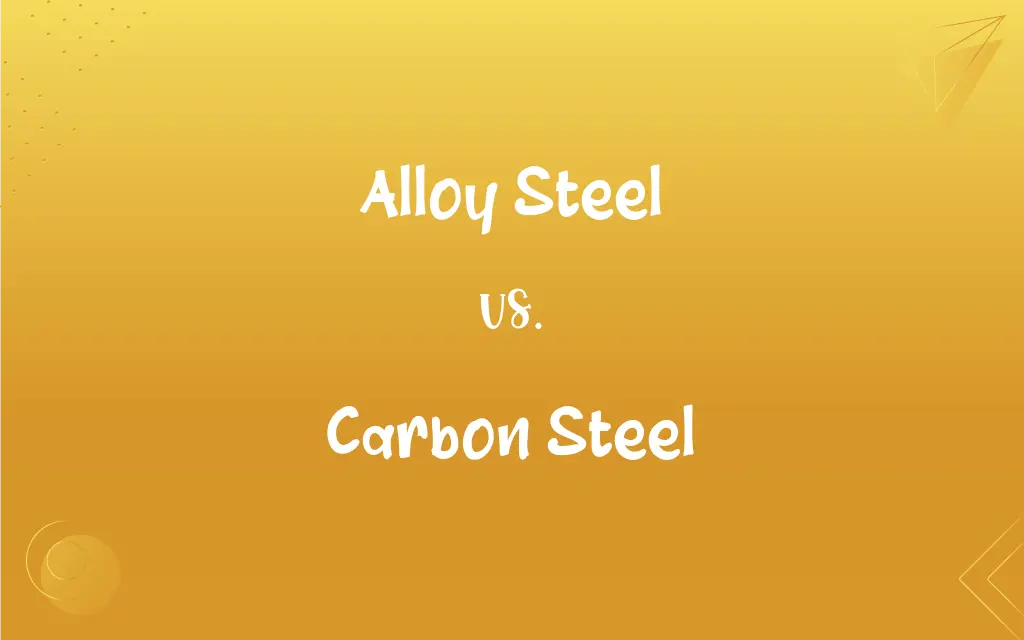Alloy Steel vs. Carbon Steel: What's the Difference?
Edited by Aimie Carlson || By Harlon Moss || Updated on October 23, 2023
Alloy steel contains additional elements enhancing properties, while carbon steel primarily consists of iron and carbon.

Key Differences
Alloy steel is a type of steel that includes a mixture of iron along with several other elements to enhance specific properties, such as strength or corrosion resistance. Carbon steel, on the other hand, is steel where the main interstitial alloying constituent is carbon, with iron being the primary component.
The primary differentiator between alloy steel and carbon steel is the inclusion and quantities of various alloying elements. Alloy steel might have elements like nickel, chromium, or molybdenum, among others. Carbon steel relies mainly on the carbon content for its structure and strength, with minimal additions of other elements.
Given its compositional diversity, alloy steel can be designed for specific uses, offering a range of properties not found in carbon steel. Carbon steel, while versatile, doesn't always have the same breadth of specialized applications due to its more limited alloying components.
From a practical standpoint, alloy steel often has advantages like better corrosion resistance or enhanced hardenability compared to carbon steel. However, carbon steel offers a balance of strength and ductility, making it suitable for many general applications.
Cost can also distinguish these two. Due to the added elements and often specialized processing, alloy steel can be more expensive than carbon steel, which is more abundantly produced and widely used in various industries.
ADVERTISEMENT
Comparison Chart
Composition
Contains multiple elements
Primarily iron and carbon
Properties
Enhanced properties like corrosion resistance
Balance of strength and ductility
Applications
Specialized applications
General applications
Cost
Often more expensive
Typically more affordable
Alloying Elements
Includes elements like nickel, chromium, molybdenum
Minimal additions beyond carbon
ADVERTISEMENT
Alloy Steel and Carbon Steel Definitions
Alloy Steel
Alloy steel is steel combined with one or more elements to improve its properties.
The bridge was built using alloy steel to resist corrosion.
Carbon Steel
Carbon steel is steel where carbon is the main alloying constituent.
The pans were made of carbon steel, ensuring even heat distribution.
Alloy Steel
Alloy steel can be tailored for specialized applications.
The aerospace industry often uses alloy steel for its strength-to-weight ratio.
Carbon Steel
Carbon steel offers a balance of strength and malleability.
Many automotive parts are crafted from carbon steel for durability.
Alloy Steel
Alloy steel offers specific advantages based on its added constituents.
Manufacturers prefer alloy steel for its enhanced hardenability.
Carbon Steel
Carbon steel is commonly employed due to its general-purpose nature.
Kitchen knives made from carbon steel retain their sharpness effectively.
Alloy Steel
Alloy steel often exhibits properties like increased strength or corrosion resistance.
The marine industry values alloy steel for its resilience against saltwater.
Carbon Steel
Carbon steel, while versatile, can be prone to oxidation without protective coatings.
To prevent rust, the carbon steel structure was galvanized.
Alloy Steel
Alloy steel incorporates diverse elements, enriching its compositional variety.
The latest alloy steel blend incorporated vanadium for improved wear resistance.
Carbon Steel
Carbon steel is categorized based on its carbon content: low, medium, or high.
The construction used medium carbon steel for its blend of strength and ductility.
FAQs
Which is more expensive, alloy steel or carbon steel?
Alloy steel is often more expensive due to added elements and specialized processing.
What constitutes carbon steel?
Carbon steel is primarily made of iron and carbon, with minimal other elements.
Are all alloy steels stainless?
No, only specific alloy steels with sufficient chromium content are considered stainless.
Does carbon steel rust?
Yes, without protective coatings, carbon steel can oxidize and rust.
Which steel type is more malleable?
Carbon steel generally offers a good balance of strength and malleability.
Can alloy steel resist corrosion?
Yes, certain alloy steels are designed for improved corrosion resistance.
What industries commonly use carbon steel?
Construction, automotive, and kitchenware industries frequently use carbon steel.
Is carbon steel magnetic?
Yes, most carbon steels are ferromagnetic.
Does carbon steel need maintenance?
Yes, especially to prevent rust. Regular cleaning and, if needed, seasoning or protective coatings are beneficial.
What elements might be found in alloy steel?
Alloy steel might contain nickel, chromium, molybdenum, and others.
How is the type of carbon steel determined?
Carbon steel is categorized by carbon content: low, medium, or high.
Is alloy steel more durable than carbon steel?
Alloy steel can offer enhanced properties like corrosion resistance, but durability also depends on specific applications and conditions.
What gives carbon steel its strength?
The carbon content primarily determines the strength of carbon steel.
What is alloy steel?
Alloy steel is steel that contains additional elements to improve specific properties.
Why is alloy steel used in specialized industries?
Alloy steel can be tailored to possess specific properties, making it suitable for niche applications.
Is carbon steel suitable for kitchenware?
Yes, carbon steel is often used for pans and knives due to its heat distribution and sharpness retention.
How do I identify the elements in alloy steel?
A material's specification or a metallurgical analysis can reveal alloying elements.
Can alloy steel be welded?
Yes, but welding parameters might vary based on its composition.
Can carbon steel be used outdoors?
Yes, but protective coatings or treatments are often recommended to resist environmental factors.
Why might a product specify its use of alloy steel?
Highlighting alloy steel can indicate enhanced properties, suitable for specific applications.
About Author
Written by
Harlon MossHarlon is a seasoned quality moderator and accomplished content writer for Difference Wiki. An alumnus of the prestigious University of California, he earned his degree in Computer Science. Leveraging his academic background, Harlon brings a meticulous and informed perspective to his work, ensuring content accuracy and excellence.
Edited by
Aimie CarlsonAimie Carlson, holding a master's degree in English literature, is a fervent English language enthusiast. She lends her writing talents to Difference Wiki, a prominent website that specializes in comparisons, offering readers insightful analyses that both captivate and inform.































































